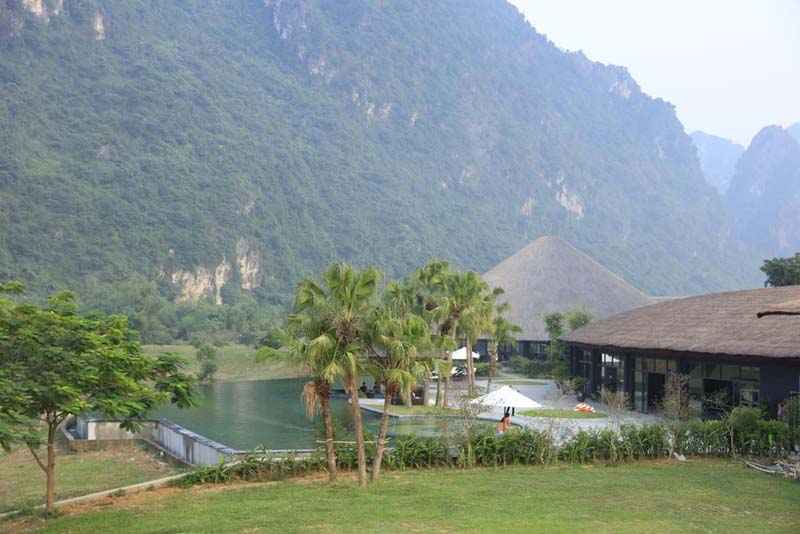
(HBO) - Kim Boi district is home to many beautiful natural landscapes, well-known for folk culture and traditional festivals imbued with Muong ethnic culture. It is endowed with a natural hot spring rated as one of the best mineral water sources in Southeast Asia, a considerable potential and strength to develop tourism. Together with Lac Thuy and Yen Thuy districts, Kim Boi will become a key tourist cluster of the province during the 2014-2020 period with a vision to 2030.
 Serena resort in Sao Bay commune,
a famous tourist destination of Kim Boi district thanks to its beautiful
scenery and hi-end services.
Serena resort in Sao Bay commune,
a famous tourist destination of Kim Boi district thanks to its beautiful
scenery and hi-end services.
A highlight of the district's
tourism is the attraction of investment in building resorts and hot springs. Investors are attentive to such kind of
investment as Serena resort, An Lac resort, Cong Doan hotel, and nursing centre
for veteran revolutionaries. Quite a few visitors are impressed by the beauty
of the nine Tu Son waterfalls like clouds floating in the middle of imposing
mountains, Mat Troi waterfall with wild beauty and clouds all year round; or
Thuong Tien nature reserve with rare and rich flora and fauna, including more
than 80 species of animals and 39 species of plants named in the Red Book of
Vietnam.
It is also a land with a long-standing history, and numerous vestiges
of historical and cultural values. Dong Thech tomb area in Vinh Dong commune
from the late 17th century, with a number of large and small stone
slabs inscribed with Han – Nom scripts, has been recognised as a national
archaeological site.
Apart from hot spring bath, managers
of tourism areas pay special attention to culinary culture with signature
dishes such as Muong Dong bamboo rice, sticky rice, chicken stewed with sour
bamboo shoots, buffalo meat, sour fish, and others that have created an
unforgettable aftertaste in the hearts of visitors. Last year, the district
welcomed over 262,000 tourists, raking in over 175 billion VND.
In order to achieve the goal
of developing high-quality tourism with high-class resorts in combination with community
tourism, the district Party Committee, People's Council and People's Committee directed
further popularising images of local tourism, calling for tourism investment, investing
in technical infrastructure and lodging facilities, and attracting private
investment while developing lodging facilities, restaurants and entertainment
areas. The district strives to welcome about 400,000 visitors and earn about
460 billion VND by 2025, serve around 650,000 tourists and rake in 900 billion
VND by 2030./.
Located just a 20-minute drive from Hoa Binh City, Ora Hill Farmstay & Glamping Hoa Binh is a captivating new destination nestled in Mo hamlet, Bình Thanh commune, Cao Phong district. Combining farming with leisure, this tranquil retreat is perfect for those seeking balance, joy, and an immersive experience in the expansive beauty of nature.
Muong Bi - Tan Lac is renowned as one of the four famous Muong regions in Hoa Binh province. Blessed by nature with a favourable climate and stunning landscapes, Tan Lac holds great advantages for tourism development. The local tourism industry has made remarkable strides in recent times thanks to the attention and support from the local authorities and sectors.
With its strategic location, well-developed transport network, and diverse soil and climatic conditions, Hoa Binh is emerging as a must-visit destination in Vietnam's northwestern tourism corridor. The province boasts numerous attractions, including the Kim Boi hot springs (Kim Boi district), the Dau Rong cave complex (Cao Phong), the Mai Chau valley (Mai Chau), and the iconic Hoa Binh hydropower plant.
The northern mountainous province of Hoa Binh has been listed among the 71 most beautiful places to visit worldwide by the prestigious US travel magazine Condé Nast Traveller.
Hoa Binh province’s rich natural and cultural resources position it as a prime location for developing community-based tourism (CBT). In recent years, support from central and provincial policies, as well as assistance from non-governmental organisations, have encouraged local ethnic minority and mountainous communities to actively engage in the sector.



 Serena resort in Sao Bay commune,
a famous tourist destination of Kim Boi district thanks to its beautiful
scenery and hi-end services.
Serena resort in Sao Bay commune,
a famous tourist destination of Kim Boi district thanks to its beautiful
scenery and hi-end services.